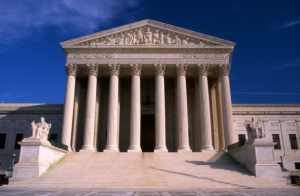
by Wilton H. Strickland
Several years ago I wrote an article on this blog explaining how to assert a Section 1983 civil rights claim against a private defendant. At the time I thought it was an obscure topic, but since then I have received numerous emails and phone calls inquiring about it and requesting my assistance. Given the large amount of interest in Section 1983 lawsuits, I thought I would explain how they work in another context, namely against local government authorities (i.e., “municipalities”).
The Unique Requirements For Holding Municipalities Liable For Violating Civil Rights
A typical Section 1983 lawsuit is aimed at a government official and alleges that he or she deprived the plaintiff of a constitutional right while acting under color of state law. But what happens if the official works for a municipal authority such as a local police department? May the plaintiff simply add the police department as a defendant because of its status as the employer, as in so many other lawsuits?
The answer is “no.” As the U.S. Supreme Court explained in its landmark decision of Monell v. Dep’t of Soc. Servs. of City of New York, 436 U.S. 658 (1978), a Section 1983 claim is unique and does not allow a municipality to be sued merely on the basis of vicarious liability/respondeat superior. Instead, the plaintiff must demonstrate that the municipality had an official policy or unofficial practice or custom that was deliberately indifferent to civil rights in general and that violated the plaintiff’s civil rights in particular. This type of claim is now known as a Monell claim.
To successfully prove a policy or custom in a Monell claim, a plaintiff must demonstrate “a persistent and widespread practice” that is “so permanent and well settled as to constitute a ‘custom or usage’ with the force of law.” Diaz v. Miami-Dade Cnty., No. 20-10245, 2021 U.S. App. LEXIS 6320, at *8-*9 (11th Cir. Mar. 4, 2021) (citations omitted). This standard “prevents the imposition of liability based upon an isolated incident.” Id. at *8 (citation omitted).
As one might imagine, the requirement to establish this pattern of conduct is often difficult to satisfy and can require extensive discovery. To make matters even more challenging, and as discussed in more detail below, some courts have front-loaded this requirement into the pleading stage and will dismiss a Monell claim unless it identifies specific incidents reflecting a policy or custom of deliberate indifference to civil rights. In my view, this is mistaken and contradicts other precedent from the U.S. Supreme Court.
The Heightened Pleading Requirement That Some Courts Impose On A Monell Claim, But Which Appears Improper
Federal Rule of Civil Procedure 8(a) governs how to assert a claim in federal court, requiring 1) a short and plain statement of the grounds for the court’s jurisdiction; 2) a short and plain statement of the claim showing that the pleader is entitled to relief; and 3) a demand for the relief sought. This lenient standard is known as “notice pleading” and does not require detailed or specific factual allegations, as might be the case in some state courts (including Florida’s) or in pleading special types of claims such as fraud and mistake (as set forth in Federal Rule of Civil Procedure 9(b)).
The U.S. Supreme Court has held that a Monell claim is subject to the ordinary rules of notice pleading and does not require detailed or specific factual allegations to survive dismissal: “We think that it is impossible to square the ‘heightened pleading standard’ . . . with the liberal system of ‘notice pleading’ set up by the Federal Rules. Rule 8(a)(2) requires that a complaint include only ‘a short and plain statement of the claim showing that the pleader is entitled to relief.'” Leatherman v. Tarrant Cty. Narcotics Intelligence & Coordination Unit, 507 U.S. 163, 168-69 (1993). Instead, reasoned the court, a better time to scrutinize the facts supporting a Monell claim is during a motion for summary judgment, once discovery has taken place and enabled the parties to gather evidence. Id. at 169.
Although Leatherman is an older decision, it often has been cited within the Eleventh Circuit to reject the notion that a plaintiff asserting a Monell claim must allege specific other incidents of misconduct by the municipality. See Hung Phan v. City of St. Petersburg, No: 8:06-cv-01818-T-17-TGW, 2007 U.S. Dist. LEXIS 30390, at *7 n.1 (M.D. Fla. Apr. 25, 2007) (rejecting argument that “more than mere conclusory notice pleading is required” because “this principle does not apply to § 1983 suits against municipalities”) (citations omitted); Adams v. Coats, No. 8:07-cv-638-T-30TGW, 2008 U.S. Dist. LEXIS 7058, at *5-*6 (M.D. Fla. Jan. 31, 2008) (“There is no heightened pleading requirement for claims against municipalities, . . . and Plaintiff need not detail the exact policy or custom that facilitated constitutional injury.”) (citations omitted); Willis v. Okeechobee Cnty, No. 11-23765-CIV-LENARD, 2012 U.S. Dist. LEXIS 193624, at *7-*8 (S.D. Fla. Aug. 16, 2012) (“The Supreme Court has held that heightened pleading requirements are not to be applied in cases alleging municipal liability under Section 1983. . . . Inclusion of the words “custom” or “policy” is not necessary to set forth a viable claim of municipality liability.”) (citations omitted); Witowski v. City of Wilton Manors, No. 0:18-cv-61944-UU, 2018 U.S. Dist. LEXIS 213725, at *18-*20 (S.D. Fla. Dec. 18, 2018); (denying motion to dismiss because “[t]here is no heightened pleading standard for municipal liability claims under § 1983[.]”) (citation omitted).
Curiously, and for reasons unknown, other decisions within the Eleventh Circuit (and by the Eleventh Circuit Court of Appeals itself) have imposed a heightened pleading standard and dismissed otherwise valid Monell claims for failing to identify supporting evidence. See Weiland v. Palm Beach Cnty. Sheriff’s Office, 792 F.3d 1313, 1320 (11th Cir. 2015); Yex v. City of Daytona Beach, No. 6:14–cv–763–Orl–DAB, 2015 WL 868073, at *6-*7 (M.D. Fla. Mar. 2, 2015); Perez v. City of Sweetwater, No. 16-24267-CIV, 2016 WL 11002555, at *6 (S.D. Fla. Dec. 22, 2016); Watkins v. Bigwood, No. 18-cv-63035-Bloom/Valle, 2020 WL 3791610 at *9 (S.D. Fla. Jul. 7, 2020); Jennings v. Stewart, 461 F. Supp. 3d 1198, 1201 (N.D. Fla. 2020).
Conclusion
These latter decisions are at odds with Leatherman and don’t even bother to mention it, so they appear to be an errant body of jurisprudence that is causing a great deal of harm to worthy Monell plaintiffs. Unfortunately, as I have explained with regard to claims of premises liability (here and here), courts are not immune to getting confused. With luck this will be straightened out, perhaps by the U.S. Supreme Court one day.
Until then, if you are putting together a Monell claim against a local government entity, you would be wise to perform initial research regarding incidents of unconstitutional conduct and make your allegations about them as specific as possible.


